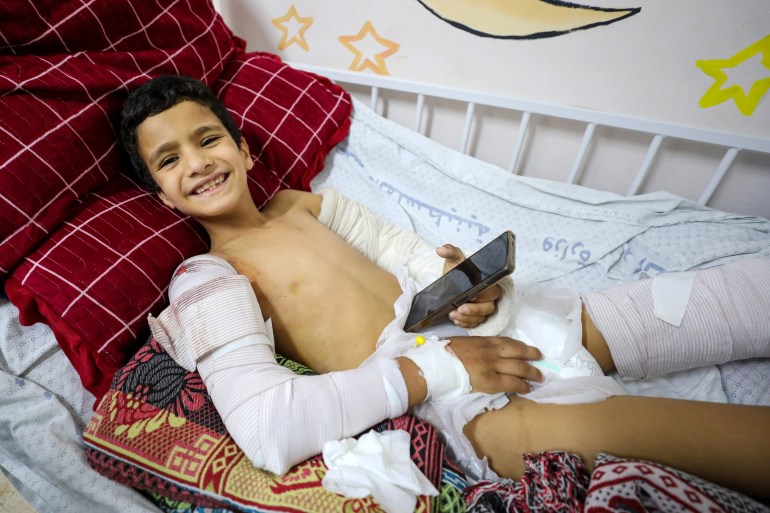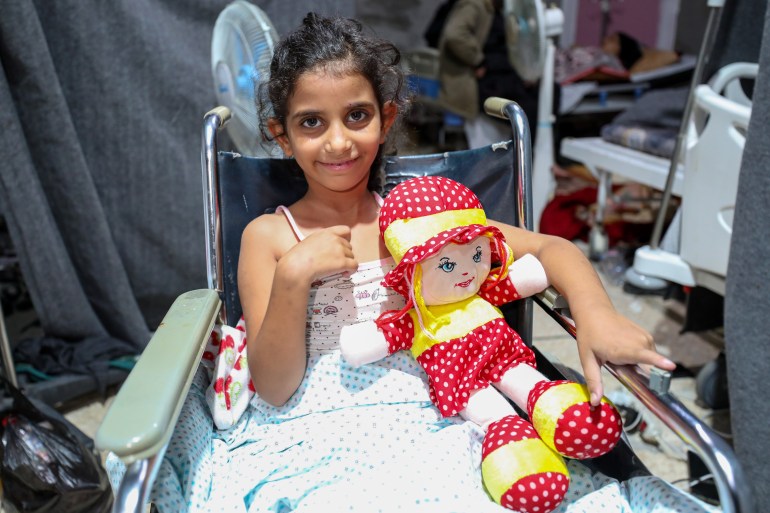Hundreds of thousands of Palestinian children have been directly affected by Israel’s onslaught on the Gaza Strip, ranging from displacement to being wounded or killed.
Since October 7, more than 10,000 children have been killed or are lost under rubble and presumed dead, according to a report by the Euro-Med Human Rights Monitor. At least 24,000 children have lost one or both parents in Israeli attacks and about 18,000 have been injured with some in critical condition.
Nearly half of the Gaza Strip’s 2.3 million people – 47 percent – are under the age of 18. The majority of them have lived through at least four Israeli offensives during their short lives.
Due to the blockade imposed by Israel on the coastal enclave, children are also facing the prospect of starvation, particularly in northern Gaza, where they eat on average one meal a day. Furthermore, the lack of clean drinking water, overcrowded conditions and lack of sanitation in United Nations-run schools, where many displaced people are seeking shelter, has led to an outbreak of infectious diseases, to which children are particularly vulnerable.
Over the past 68 days, more than 18,700 Palestinians have been killed in Israeli attacks, including more than 7,700 children, according to the Ministry of Health in Gaza. This means that one Palestinian child is killed every 10 minutes, leading the World Health Organisation to describe the situation as “humanity’s darkest hour”.
Nearly 8,000 people are missing and presumed dead under the rubble of their homes, and more than 50,000 have been wounded – the vast majority women and children.
Despite the UN general-secretary saying on October 31 that Gaza has turned into a “graveyard for children, a living hell for everyone else”, the Israeli offensive and ground invasion has continued and shows no sign of slowing down.
“The ongoing Israeli attacks have left over 18,000 Palestinian children injured with many in critical condition,” the Euro-Med monitor said. “Dozens more have suffered amputations, and hundreds more have suffered severe burns to various parts of their bodies.”
At Deir el-Balah’s Al-Aqsa Martyrs Hospital, Al Jazeera spoke to several children who had survived Israeli bombardments either directly on their homes or in their neighbourhoods.
‘I miss my school’: Sa’ed al-Areer, eight, from Shujayea

I was playing in the street with my cousin outside the house in Maghazi refugee camp. The Israeli planes bombed the building opposite us. I suffered a fractured skull, stitches all around my head, a broken leg and a big wound that doctors said exposed my bone.
My favourite football players are Alaa Attiya and Omar Khamis from the Shujayea Football Club. They score a lot of goals. I’ll play when we go back to our homes, but I don’t have a football. I still want to be a football player when I grow up. I miss my school.
‘War is stupid’: Abdullah Jabr, eight, from Bureij refugee camp

My mother was making supper for us when our next-door neighbour’s house got targeted. The walls of our home fell on top of us, breaking my leg and my arm in two places. Our home is gone.
I like Cristiano Ronaldo, but I want to be a doctor, so I can help children get better. I hope my medical referral sends me to the United Arab Emirates not to Egypt because I don’t want to travel in a car to Egypt. I want to get on a plane and look out the window when I’m in the sky. I want to get better and come back to Gaza.
War is stupid. I want it to end. I’ve saved 1,000 shekels [$270]. My dad is keeping them safe for me. My favourite food is chicken wings, and I want to take my family out to a restaurant after this is over.
‘I was playing on the swing’: Mayar Abu Saad, 12, from Shati refugee camp

We left our home in Shati and went to stay with my grandpa in Nuseirat. My grandfather said we should go down to the yard and bake bread. A missile struck our home, and those inside like my Aunt Tagreed, Uncle Sameh, Uncle Mohammed and my cousin Rital were killed, 11 in total. My sister Sabah was also killed. She was so young, only two years old.
I was playing on the swing in the yard, and when I woke up, I found myself in the hospital. The doctors cut my long hair and I was so upset. They thought I was going to die, but my heart kept beating. They operated on me for four hours and said I have internal bleeding, a fractured skull, broken pelvis and two broken legs.
I have stitches on my hand and stomach, and my legs have titanium parts. I want to be a teacher, and my favourite subject is English.
‘The sound was scary’: Hayat Miqbil, seven, from Karameh, northern Gaza

We were at my grandfather’s house in Nuseirat eating moussaka when the Israelis bombed us. The sound was scary. My mother, grandad, Uncles Mustafa, Sameh and Taiseer, his wife and my cousins Hamoud and Uday were all killed.
Mama was outside. I was injured in my legs. Both of them are broken. My Baba and Aunt May are taking care of me. I was sitting under the window and saw the missile falling. We thought it was heading behind our house. I remember a man rescued me from under the rocks. My legs were stuck. I want to be a dentist, so I can fix my dad’s teeth. I like drawing and playing with my dolls.
‘I had shrapnel in my stomach’: Issa Yahya, 10, from Bureij refugee camp

I’m the first in my class. Our neighbour’s home in Nuseirat was bombed, and the walls of our house collapsed on us. We were under the rubble. My grandpa pulled me out. I had shrapnel in my stomach and couldn’t eat for 10 days. My legs have more than 50 stitches.
My grandma and cousin were killed. I want to be a doctor, and my favourite subject in school is maths.









